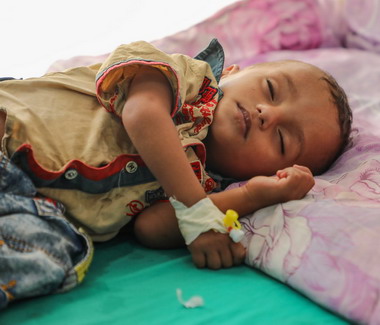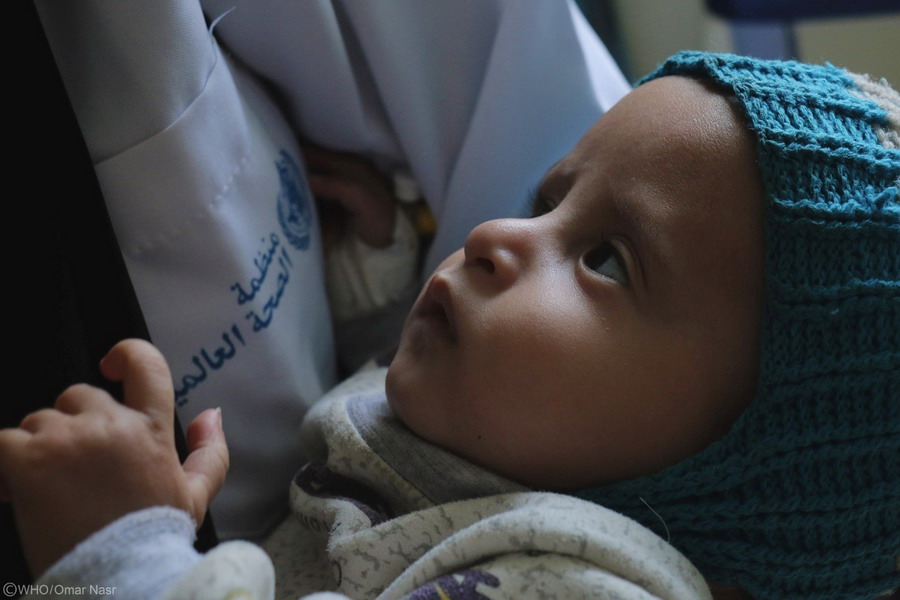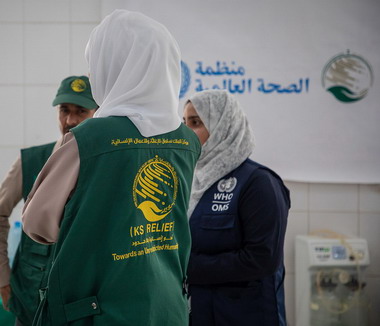Acute malnutrition threatens half of children under 5 in Yemen in 2021: United Nations
Humanitarian crisis continues to exert a terrible toll on children, warn FAO, UNICEF, WFP and WHO

Sana’a/Aden/Rome/New York/Geneva, 12 February 2021 – Nearly 2.3 million children under the age of 5 in Yemen are projected to suffer from acute malnutrition in 2021, 4 United Nations agencies warned today. Of these, 400 000 are expected to suffer from severe acute malnutrition and could die if they do not receive urgent treatment.
The new figures, from the latest Integrated Food Security Phase Classification (IPC) Acute Malnutrition report released today by the Food and Agriculture Organization of the United Nations (FAO), UNICEF (the United Nations Children’s Fund), the World Food Programme (WFP), the World Health Organization (WHO) and partners, mark an increase in acute malnutrition and severe acute malnutrition of 16% and 22%, respectively, among children under 5 years from 2020.
The agencies also warned that these were among the highest levels of severe acute malnutrition recorded in Yemen since the escalation of conflict in 2015.
Malnutrition damages a child’s physical and cognitive development, especially during the first 2 years of a child’s life. It is largely irreversible, perpetuating illness, poverty and inequality.
Preventing malnutrition and addressing its devastating impact starts with good maternal health, yet around 1.2 million pregnant or breastfeeding women in Yemen are projected to be acutely malnourished in 2021.
Years of armed conflict and economic decline, the COVID-19 pandemic and a severe funding shortfall for the humanitarian response are pushing exhausted communities to the brink, with rising levels of food insecurity. Many families are having to resort to reducing the quantity or quality of the food they eat, and in some cases, families are forced to do both.
“The increasing number of children going hungry in Yemen should shock us all into action,” said UNICEF Executive Director Henrietta Fore. “More children will die with every day that passes without action. Humanitarian organizations need urgent predictable resources and unhindered access to communities on the ground to be able to save lives.”
“Families in Yemen have been in the grip of conflict for too long, and more recent threats such as COVID-19 have only been adding to their relentless plight,” said FAO Director-General QU Dongyu. “Without security and stability across the country, and improved access to farmers so that they are provided with the means to resume growing enough and nutritious food, Yemen’s children and their families will continue to slip deeper into hunger and malnutrition.”
“These numbers are yet another cry for help from Yemen where each malnourished child also means a family struggling to survive” said WFP Executive Director David Beasley. “The crisis in Yemen is a toxic mix of conflict, economic collapse and a severe shortage of funding to provide the life-saving help that’s desperately needed. But there is a solution to hunger, and that’s food and an end to the violence. If we act now, then there is still time to end the suffering of Yemen’s children.”
Diseases and a poor health environment are key drivers of childhood malnutrition,” said WHO Director-General Dr Tedros Adhanom Ghebreyesus. “At the same time, malnourished children are more vulnerable to diseases including diarrhea, respiratory infections and malaria, which are of great concern in Yemen, among others. It is a vicious and often deadly cycle, but with relatively cheap and simple interventions, many lives can be saved.”
Acute malnutrition among young children and mothers in Yemen has increased with each year of conflict with a significant deterioration during 2020 driven by high rates of disease, such as diarrhoea, respiratory tract infections and cholera, and rising rates of food insecurity. Among the worst hit governorates are Aden, Al Dhale, Hajjah, Hodeida, Lahj, Taiz and Sana'a City, which account for over half of expected acute malnutrition cases in 2021.
Today, Yemen is one of the most dangerous places in the world for children to grow up. The country has high rates of communicable diseases, limited access to routine immunization and health services for children and families, poor infant and young child feeding practices, and inadequate sanitation and hygiene systems.
Meanwhile, the already fragile health care system is facing the collateral impact of COVID-19, which has drained meagre resources and resulted in fewer people seeking medical care.
The dire situation for Yemen’s youngest children and mothers means any disruptions to humanitarian services – from health to water, sanitation and hygiene, to nutrition, food assistance and livelihoods support – risk causing a deterioration in their nutrition status.
The humanitarian response remains critically underfunded. In 2020, the Humanitarian Response plan received US$ 1.9 billion of the US$ 3.4 billion required.
#####
Notes for editors
Multimedia materials available here: https://weshare.unicef.org/Package/2AM40805FSQX
IPC report links:
Full report: https://bit.ly/2N1WMyt
Analysis page: http://www.ipcinfo.org/ipcinfo-website/alerts-archive/issue-34/en/
About WFP: The United Nations World Food Programme is the 2020 Nobel Peace Prize Laureate. We are the world’s largest humanitarian organization, saving lives in emergencies and using food assistance to build a pathway to peace, stability and prosperity for people recovering from conflict, disasters and the impact of climate change.
About FAO: The Food and Agriculture Organization (FAO) is a specialized agency of the United Nations that leads international efforts to defeat hunger. Our goal is to achieve food security for all and make sure that people have regular access to enough high-quality food to lead active, healthy lives. With over 194 members, FAO works in over 130 countries worldwide.
With the support of Germany, WHO and INTERSOS provide life-saving medical care to children in Ibb governorate

2 February 2021 – Children are among the most impacted by the ongoing conflict and its consequences on health care services. Thanks to Germany’s support, WHO and INTERSOS have been able to provide them with life-saving medical care.
A country hammered by years of conflict, Yemen has been marked as the world's worst humanitarian catastrophe, with nearly 24.3 million people – 80% of the population – in need of humanitarian assistance in 2020. The health system has worsened amid the crisis, and 17.9 million people needed health care services in 2020. At the same time, only half of the health facilities are fully or partially functioning. Those that remain open lack the bare necessities like fuel, water, essential medical supplies, and qualified health staff.
With the Government of Germany's support, the World Health Organization (WHO) and INTERSOS are working together to support 6 health facilities in Far Al-Udayn and Hazm Al-Udayn districts in Ibb governorate. The support entails providing emergency primary and secondary health and nutrition services and reinforcing outreach and referral mechanisms with a network of community health volunteers.
The partnership aims to reduce morbidity and mortality of the most vulnerable conflict-affected populations, focusing on children under 5 and pregnant and lactating women.
Yazid, an 11-year-old boy, lives with his family in Hayran, a village in Far Al-Udayn district. In October 2020, he was brought to Al-Mazhan District Hospital after suffering for 3 days from high fever, persistent vomiting, joint pain, and hematuria. The boy was found to have malaria. He was admitted to the inpatient department, where he received anti-malarial treatment, including intravenous therapy and other necessary medications. The boy's condition was continuously followed up by doctors and health staff at the health facility until he fully recovered a few days after being admitted.
Malaria is one of the infectious diseases for which the WHO-INTERSOS partnership supports health facilities in Ibb governorate. The region has recently witnessed a significant spread of malaria and other mosquito-borne diseases, making support to local health facilities even more crucial.
"After 6 years of war, we all suffer from the effects of the difficult humanitarian situation. We hope the world will look at us", wishes Mohammed Muharram, a Yemeni Health Supervisor at INTERSOS. "We thank WHO and all colleagues working with us for their great commitment towards the good of the Yemeni people," he said.
Hail is a 4-year-old boy who lives with his family in Al-Dashen village, Hazm Al-Udayn district. Early October, his mother took him to Bani Assad Health Centre because he had been suffering from intermittent watery green diarrhoea. The medical investigation found signs of improper feeding, probably related to the socioeconomic vulnerability of the family. His anthropometric measurements were 11.1 kg of weight, 96.1 cm of height MUAC of 13.3 cm and Z-score below -3. INTERSOS nutrition team at the health facility provided Hail's mother with therapeutic food and medicines, advising her about how to administer them to her son. A community health volunteer visited the boy at home regularly to monitor his recovery. After 4 weeks of treatment, Hail regained his appetite. His anthropometric measurements gradually improved to 11.5 kg, 96.1 cm height, 13.5 cm MUAC and Z-score.
Thanks to Germany’s support, WHO and INTERSOS have supported the provision of nutrition services to internally displaced people and host communities at the primary health care centre level as part of their joint nutrition response. Children under 5 and pregnant and lactating women are screened and referred to relevant nutrition programmes in the health facilities, while community health volunteers ensure malnutrition's screening and referral, as well as sensitization on health, nutrition and infant and young child feeding at the community level.
Abdullah is a 10-year-old boy from Al-Sana village in Hazm Al-Udayn district. In November, his parents took him to Bani Wa'il Health Centre because he suffered from a large swelling on his left arm. After minor surgery to remove the swelling, Abdullah left the facility on the same day, being advised to return regularly for dressing and follow-up. His parents received the necessary medications to prevent secondary infection. A few days later, Abdullah had completely recovered and was again able to play with his friends.
WHO and KSrelief are working together to support COVID-19 preparedness and response in Yemen

Cairo, 27 January 2021 – The World Health Organization (WHO) and the King Salman Humanitarian Aid and Relief Centre (KSrelief) have joined forces in the fight against COVID-19 pandemic in Yemen through a new project to support COVID-19 preparedness and response.
Under this new award, WHO will work with the Ministry of Public Health and Population to enable rapid detection and response to COVID-19 cases and clusters, including through an integrated, multisectoral coordination system at central and governorate levels and support to emergency operation centres (EOCs) across the country. Twenty-six main entry points to Yemen will be equipped to enable rapid COVID-19 detection.
Thanks to this partnership, critical support will continue to be provided to surveillance by supporting COVID-19 rapid response teams in high-priority districts. Furthermore, additional support will be provided to 1991 sentinel sites reporting through the Electronic Integrated Disease Early Warning System (EIDEWS). This surveillance system collects information on epidemic-prone diseases to trigger prompt public health interventions to reduce morbidity and mortality through early detection and rapid response to disease outbreaks, including COVID-19.
The joint project will also enhance the testing capacity of central public health laboratories throughout the country and support the prevention of COVID-19 transmission in health and non-health settings. Multifaceted support to health facilities will improve their capacity to receive COVD-19 patients by providing medical supplies and equipment and case management training for health workers.
"Thanks to this new contribution from KSrelief, WHO will be able to provide comprehensive support to the national COVID-19 response. It is particularity timely as WHO and health partners are preparing for a potential new spike in infections," said Dr Adham Ismail, WHO Representative in Yemen.
Funded at US$ 13 million, the project is part of a broader US$ 46 million agreement between the 2 organizations, signed in September 2020, that also included 3 other projects on nutrition, water and environmental sanitation services, and delivery of essential health services.
KSrelief has been the main funding partner of WHO Yemen in 2019–2020. Since October 2019, the partnership between the 2 organizations has helped preserve Yemen's health system, including through support to the most vulnerable. Continuous support from KSrelief has allowed WHO to facilitate the provision of life-saving medicines, including treatment for patients with chronic, life-threatening conditions, such as cancer and kidney failure. The partnership has also supported maternal and child health, including assistance to pregnant women for safe birth deliveries.
About the humanitarian crisis in Yemen
Yemen remains the world's worst humanitarian crisis and the WHO's most complex operation. Some 24.3 million people – 80% of the population – needed humanitarian assistance or protection in 2020.
The health system is on the brink of collapse. More than 17.9 million people (out of the total population of 30 million) needed health care services in 2020. At the same time, only half of the health facilities are fully or partially functioning. Those that remain open lack qualified health staff, essential medicines and medical equipment, such as masks and gloves, oxygen and other necessary supplies.
COVID-19 is underlying Yemen' public health vulnerabilities. As of 26 January 2021, Yemen's health authorities have reported 2122 confirmed cases of COVID-19, with 616 associated deaths. Health partners are concerned that underreporting continues in some areas of the country due to a lack of testing facilities, delays in seeking treatment, stigma, difficulty accessing treatment centres or the perceived risks of seeking care. Moreover, it can indicate the large asymptomatic infections that are yet to be detected in the country. Health partners on the ground continue working towards increasing surveillance; deploying dedicated COVID-19 staff within agencies; tracking the virus's impact on routine priority health programmes; refining messaging to encourage behavioural change; and boosting intensive care unit (ICU) capacity.
Note to correspondents
Sana'a, 19 January 2021 - The World Health Organization (WHO) office in Yemen denies what has been reported in local media about its intention to stop its support to Yemen's health facilities with the fuel needed to operate them.
The office confirms that despite severe funding shortages, the necessary financial resources have been mobilized already to supply all 105 health facilities supported in 2020 with fuel until mid-February at least. Furthermore, 42 health facilities, most of them in the northern governorates of Yemen, will be provided with the needed fuel during the remainder of the year.
The office continues to discuss with donor partners ways to provide fuel for the remaining health facilities. At the same time, it is looking with health authorities into all funding scenarios, their potential implications and available options to ensure the continuity of this vital support for health facilities across Yemen.


